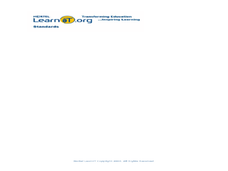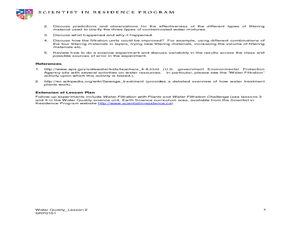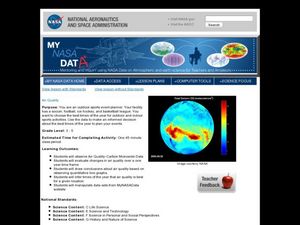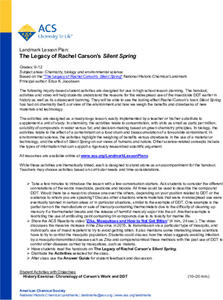Curated OER
A Generation that Cares: Saving our Environment!
Students discover the dangers posing our environment. In this environmental awareness lesson, students investigate problems like global warming and pollution and discuss ways their generation can solve these issues. Students research...
Curated OER
Reduce Reuse Recycle
Students discover methods that can save the planet by recycling. In this sustainable planet lesson, students read The Berenstein Bears Don't Pollute Anymore, and practice memorizing the 3 R's. Students write commitment letters...
Curated OER
Lesson 5: Technology: Conveniences and Consequences
Students identify positive and negative impacts of technology. In this technological advancements lesson, students consider how toxic pollution affects the Earth and its inhabitants. Students participate in 3 activities that allow them...
Curated OER
Recycling
Middle schoolers relate recycling to waste reduction. For this science lesson, students talk about the environment and how recycling certain natural resources actually saves on energy. They also discuss what type of recycling causes...
Curated OER
Water Quality: Water Filtration
Young scholars build a water filtration system. In this water quality activity, students work in groups to construct water filtration units that can purify contaminated water. This activity is part of a larger unit on water quality.
Curated OER
Water filtration with Plants
Sixth graders explain how soil and plants effect contaminated water in nature. In this filtration lesson, 6th graders work in groups to test biofiltration units. Students determine which biofiltration units work best and how they can...
Curated OER
100 Things You Can Do to Save the Planet
Students examine the possible ways to recycle, reuse, and re-imagine products and objects in order to reduce pollution and waste on our planet. In this 100 things you can do to save the planet lesson, students take three actions to...
Curated OER
Water, Water Everywhere and Not a Drop to Drink
Learners identify the different stages in the water cycle. In this environmental science lesson, students research about different water pollutants in watershed. They describe ways to purify water.
Curated OER
Exhaust, Gas and Pollution
Students watch a demonstration of how bromthymol blue is used to indicate the presence of carbon dioxide in a gas. They design their own experiments to test gasses which are suspected of containing carbon dioxide.
Curated OER
Air Quality
Middle schoolers investigate what is known as the Greenhouse Effect. They begin to explore what some scientist think is the nature and fundamental causes of this problem. Students are able to give suggestions for alternative causes of...
Curated OER
Global Change — Change and Cycles Where Land, Air and Water Meet
Students participate in an experiment to define a parts-per-billion solution. In this ecology lesson, students select a second substance to create a parts-per-billion solution and observe and record their results. Students work in groups...
San Francisco Public Utilities Commission
Recycled Water: A Smart Way to Reuse Water
Learn about wastewater and recycled water with a science reading activity. After learners finish a two-page passage about conserving the water supply, they answer six comprehension questions about what they have read.
Kenan Fellows
Designing a Water Treatment Plant
How does dirty water get clean enough to drink? After viewing a PowerPoint that outlines the process water goes through at a water treatment plant, groups work together to design a chlorination chamber for a treatment plant.
Kenan Fellows
Determining Stream Health by the Diversity and Types of Benthic Organisms
How diverse are the benthic organisms found in local streams? Using the information learned in previous lessons on identification of macroinvertebrates and on calculating stream index values, groups determine the health of local streams....
Safe Drinking Water Foundation
I Want to Be an Engineer
Environmentalists turn into engineers! Your class explores the perspectives of an engineer and water keeper, including the necessary steps that are taken in order to build a water treatment facility.
DiscoverE
Harmless Holder
Here's a lesson plan that's not for the birds! Scholars design and build packaging for soda cans that is environmentally friendly. These packages must be durable, easy to carry, and have no environmental impact.
Just Health Action
Equity Impact Review: Green Stormwater Infrastructure in Seattle
Using an Equity Impact Review (EIR) tool, developed by Washington state's King County to "identify, evaluate, and communicate issues of equity when making a decision," class members design a GSI program for two Seattle neighborhoods.
American Chemical Society
The Legacy of Rachel Carson’s Silent Spring
How do we protect crops and protect the environment at the same time? Using reading materials, learners explore the history of the use of pesticides and biocides. They create a timeline and then explore the current practices.
National Wildlife Federation
Plastic in the Sea
How much plastic do people use? Class members identify how plastic is involved in their daily lives by looking at food packaging either at a grocery store or at home. Learners view statistics for the amount of plastics found on a beach...
University of Waikato
Ocean Acidification and Eggshells
Eggshells and seashells have a lot in common. Learners use the similarities to conduct an experiment that models the effect of ocean acidification on marine animals. Using varying levels of acidic liquids, pupils make observations on the...
Bonneville
Design and Engineer Solutions
What's the best way to collect all that trash? A culminating activity has scholars use the knowledge and skills from the unit to design a solution to the plastic trash island problem. They use 3-D pens or a 3-D printer to build models of...
GLOBE Program
Observing Visibility and Sky Color
What does a beautiful sunset have to do with the atmosphere? An inquiry-based lesson has learners make observations about the visibility and color of the sky during different time periods. They then relate their observations to...
Environmental Protection Agency (EPA)
Excuse Me, Is This the Way to the Drainpipe?
Elementary kids read and color the story of Willy Wetsworth, a drop of water, as he describes the journey that he and his friends take to provide fresh water to houses. He tells his story to Martha Merriweather, a little girl, and...
Curated OER
Science Concept Maps
A collection of concept maps has some terms filled in and others left blank for young scientists to fill in. This library can provide you with many pop quizzes for all of your middle to high school science curriculum.
Other popular searches
- Water Pollution
- Air Pollution
- Water Pollution Worksheets
- Air Quality
- Water Pollution Experiments
- Ocean Pollution
- Air Pollution Experiments
- Noise Pollution
- Air and Water Pollution
- Sources of Water Pollution
- Ground Water Pollution
- Fresh Water Pollution

























